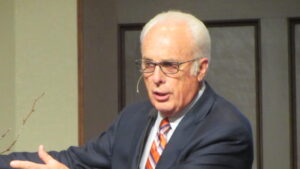This is the time of year when the world starts to turn its attention to baby Jesus. The incarnation is obviously an occasion for celebration and a source of hope and joy for Christians, but the Nativity story also has an enduring appeal to the secular world. Perhaps that is because it is fundamentally viewed as a humble beginning story.
Humble Beginnings
A humble beginning story is universally compelling.
One of my all-time favorite comedy acts is a Monty Python skit called “The Four Yorkshire Men.”[1] As the title implies, the British comedians play four men with Yorkshire accents, each wearing suits and sporting enormous mustaches, sitting in plush leather chairs in an exclusive member’s club, smoking huge cigars. They are decrying the fact that today’s youth cannot understand how hard they had it when they were young.
As their conversation progresses, they try to outdo one another with accounts of deprived childhoods, which in typical Python style, become increasingly absurd. One of the men dismisses the other’s sad tale, telling him he could only have dreamed of living with his whole family in a single room with a leaky roof; for his part, he had to be content with living in the corridor. The next man wistfully luxuriates in the thought of a childhood with a corridor, since he grew up in a cardboard box on the side of the motorway; immediately, the fourth Yorkshireman exclaims, “Cardboard box?! Luxury!” And of course, it only spirals out further from there. It is a perfect parody of rich men’s penchant for nostalgic conversations about their humble beginnings and difficult upbringings, which are so cliché.
It’s true, we love humble origin stories. We want our heroes to boast: “I came from nothing and built myself up to be the man I am today.” One of the most dismissive accusations you can level at a wealthy man is that he is a trust-fund baby, a nepo baby, or any kind of baby born with a silver spoon in his mouth.
That is why so many wealthy men exaggerate the humility of their beginnings to justify their current wealth. Consider how much ink has been spilt over what Donald Trump inherited from his father. Trump himself told NBC News it was a $1 million loan, but the New York Times investigated his claim and concluded it was a $400 million gift.
If we have learned anything from all the societal discussion around equity and privilege, it is that our culture values wealth but we also want that wealth to be deserved. If you are well-off because you inherited your wealth, you do not deserve it. But if you had to work your way up and you put in the work, then your story is admirable and your wealth is a source of inspiration.
It is clear the world aspires to wealth, so why is it important that we feel it is deserved? Well, because we ultimately want to justify wealth. A humble past is great as long as it justifies a wealthy present. But a humble beginning followed by a lifetime of more humility? No thanks!
So while the world can get behind a baby born in a cow’s feeding trough, an origin story that even the four Yorkshiremen could appreciate… it is much harder for the world to accept the rejected, bloodied, murdered adult Jesus. And it can be even more difficult for the world to accept the lowly foot-washing Jesus.
But that is precisely the call to the Christian. Blessed are the meek, for they shall inherit the earth (Matt. 5:5).
Marvelling at His Birth
Of course, Christians know the Nativity story is much more than just another underdog story. Christmas is a time for Christians to marvel at the condescension of God. Jesus Christ, the son of God, chose to live out the full human experience, and chose to do so by rejecting not only the comforts of Heaven and the throne of God, but even the comforts of this world by being born in abject poverty and in the most precarious of circumstances, devoid of any of the human comforts widely available at the time—no luxury suite at the inn, not even a room with a leaky roof or a corridor, nothing but a manger in an open barn, a feeding trough for cattle.
But Jesus was not merely born into precariousness to provide an inspirational tale of overcoming the odds and climbing his way to the top. Christ lived out the fullness of his earthly ministry in the same material poverty. Foxes have holes, and birds of the air have nests, but the Son of Man has nowhere to lay his head. (Matt. 8:20)
What’s more, not only did Jesus choose to live in humble circumstances, but he chose to live out humble acts like washing the feet of his followers.
During supper, […] Jesus, knowing that the Father had given all things into his hands, and that he had come from God and was going back to God, rose from supper. He laid aside his outer garments, and taking a towel, tied it around his waist. Then he poured water into a basin and began to wash the disciples’ feet and to wipe them with the towel that was wrapped around him. (John 13:2-15)
Foot washing was a necessity in the context of John 13. Jesus and his disciples lived in an arid and dusty environment. No galoshes in sight, no boots, just open-toe sandals and exposed sweaty feet. And in this passage, we find them all sitting down close to each other on the floor, where their feet would not even have been hidden under the table but out in the open as they reclined at a low table.
But just to be clear, no one would ever offer to wash someone else’s feet. Nor would you ever ask someone else to wash your feet for you. Not even a Jewish slave… maybe a wretched Gentile slave, but it was simply too degrading a task for anyone else.
The fact that Jesus got up, removed his outer cloak, fastened the towel around his waist, got down on the ground at the feet of his disciples with a basin of water, washed their feet, and dried them with his towel was simply mind-boggling, an absolutely shocking thing for him to do.
All the more so when you consider what John has underlined for us here, knowing that the Father had given all things into his hands. Jesus was granted all things into his hands, all the power to create and destroy worlds, all the power that human emperors and pharaohs, billionaires, moguls, and oligarchs have all been coveting since Adam, willing to kill for just an ounce of this power. It is all vested in Jesus, and what does he do with it? He chooses humility and meekness; this is how he chooses to wield his dominion.
As you read John 13 and picture Jesus starting to wash the feet of his disciples, one by one, including Judas, presumably, it strikes you that this must have been a very awkward scene. There must have been confused looks quietly exchanged, awkward silence, and only reluctant and very uncomfortable acceptance of what he was doing. No one wants to see their friend, their leader, their Lord in such a degrading position.
I don’t know if you have ever witnessed someone you look up to and respect abase themselves. It’s unpleasant, it can even trigger anger. What are you doing? Have some respect for yourself, man! But then what hits you even harder as you read on, is that this is meant as an example for us to follow!
After washing their feet, Jesus asks his disciples, “Do you understand what I have done to you?” (Jn 13:12) John is gracious enough not to record their blank stares in response; he simply captures Jesus answering his own question for their benefit and ours: The foot washing is a template for Christian living.
If I then, your Lord and Teacher, have washed your feet, you also ought to wash one another’s feet. For I have given you an example, that you also should do just as I have done to you. Truly, truly, I say to you, a servant is not greater than his master, nor is a messenger greater than the one who sent him. (Jn 13:14-16)
If you call Jesus Christ your teacher and Lord, if you are a follower of Christ, if you call yourself a Christian, then you do what Jesus Christ teaches you to do. And in this act of foot-washing, Jesus taught his followers to love each other and to humble themselves towards each other.
There really isn’t any way around this. He did this in order to demonstrate a model for his followers, that’s all of us who call ourselves Christian. It is a model of Christian Love and Humility. There is simply no one in this world we have the right to exalt ourselves over. Jesus makes that clear.
After all, Christ washed the feet of Judas! He knew who he chose, and he knew what he was doing; all things had been granted into his hand by God, and he washed the feet of his followers and of his mortal enemy alike. And Christ has told all who would follow him to do likewise:
The follower of Christ embraces humility. The Christian loves like Christ, is meek like Christ, humbles himself like Christ, and dies to himself like Christ. If you understand what Christ has done for you and you live likewise, blessed are you. (Jn 13:17)
Humility at the Cross
This is the glorious call to the Christian; this is the blessed life of the Christian. To be clear, Christian humility is not demeaning or self-deprecating. As Tim Keller helpfully wrote in his book “The Freedom of Self-Forgetfulness” that “humility is not thinking less of yourself, it’s thinking of yourself less.” But neither is Christian Living an upgrade to first class. The Christian call is not a fast pass over all the others to the front of the line. The Christian does not pray that God would bless them with the Platinum, VIP, First Class, All-access, Upgraded, Front of the line treatment.
The Christian call is, as much as possible, to take ourselves out of the equation of our decision-making altogether. By focusing on Christ rather than our own circumstances, we may put others ahead of ourselves, and that is where we find our blessing: When we are the last and the least with our Lord.
When Jesus is most abased, the most humbled, it is as an act of love towards those he loves in the world. In this way, he is pointing forward to the cross and explaining to his disciples why it has to be that way. When he is humbled, humiliated even on the cross, when he is at his lowest, it is driven by his love for his followers.
This Christmas, as we remember and celebrate the humility of Christ in the nativity story, let us also be reminded that Christ never outgrew his humility. Christ in the manger is not the humble origin story of a great and powerful King who overcame his circumstances to claim a golden throne in this world. As my pastor put it recently, Christ is the King who was enthroned on the wooden cross.
Jesus cast aside all comfort and pride throughout his perfect, sinless life, and he told his followers that if we understand his humility and choose to live our own life in humility, we will receive our blessing there, in the lowliness. That’s where we will find Christ.
[1] The sketch actually pre-dates the Monty Python, but was written by a couple of the Pythons and was readapted by the troupe in later years. Watch it here https://www.youtube.com/watch?v=ue7wM0QC5LE




















